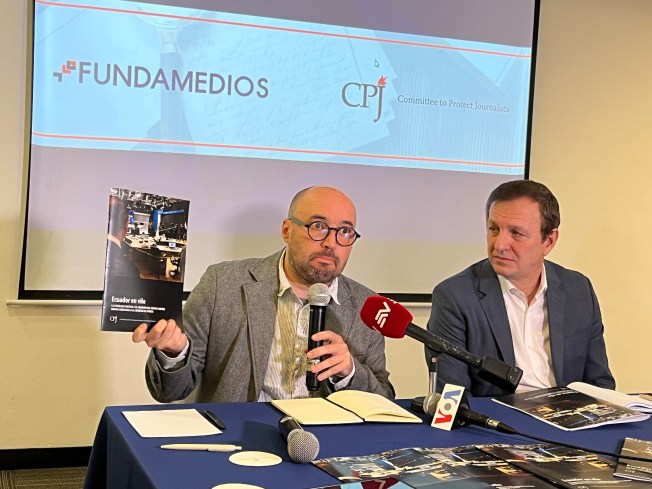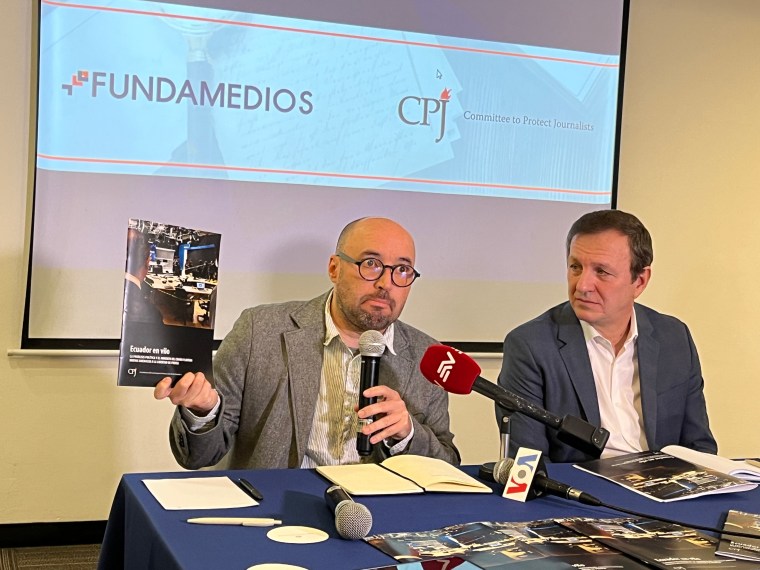Ecuador on edge: A Q&A with CPJ Program Director Carlos Martínez de la Serna

CPJ traveled to Quito, Ecuador, twice this year amid ongoing conversations with government officials to improve the conditions journalists are facing throughout the country. The past few years have seen increased violence against members of the press, including several journalists receiving bombs through the mail. For this issue of Insider, we spoke with CPJ Program Director Carlos Martínez de la Serna about his travels to Ecuador, the release of our report “Ecuador on edge” this summer, and what CPJ has been able to accomplish.
What was CPJ able to do on the ground in Ecuador, and how was each trip different?
On the first trip in April, we met with government representatives, local journalists, editors, members of the national assembly, authorities, representatives from foreign embassies, and international donors. These meetings helped us assess firsthand the impact of the security and political crisis on journalists in the country. We helped broker an agreement for the government to deliver critical funds to the existing mechanism to protect journalists and additional funding to support the attorney general, as well as new efforts to combat misinformation.
We traveled back to Ecuador in June to launch a report documenting the impact of political paralysis and spiking crime on press freedom in the country, and to monitor the pledges made by the government during our first visit.
Former President Rafael Correa has a history of anti-press rhetoric and action—an all-too-familiar global theme among democracies today. How is his legacy shaping the environment for the media, and how can Ecuador foster a free and independent press?
Former President Rafael Correa, who ruled from 2007 to 2017, caused lasting damage to journalism in Ecuador. Correa’s anti-press actions, which included filing defamation lawsuits, enacting restrictive measures, and smearing critics, have weakened the media’s ability to report the news. The press is still a target.
In “Ecuador on edge,” we issued several recommendations for the Ecuadorian executive branch; judicial, administrative, and law enforcement authorities; and for the international community to address this situation and the ongoing security crisis. The executive branch should take the necessary steps to swiftly implement the new Communications Law and deliver critical financial resources for the effective functioning of the existing mechanism to protect journalists.
How have CPJ’s recommendations to Ecuadorian authorities and the international community been received?
There’s a consensus about the importance of following up on these recommendations among all sectors we’ve consulted with, including the executive branch. But the timing, and the urgency of implementing them, are significant challenges in a context of national security crisis and political instability, with new presidential elections happening this month.
Despite these challenges, in our last meeting the government committed to implementing our recommendations on the communications law and the protection mechanism before it leaves power at the end of the year.
What are the next steps for holding Ecuadorian authorities to account?
We need to keep working with our local partner, Fundamedios, and journalists to monitor the government’s implementation of our recommendations and assess how the country’s protection mechanism is improved.
Just since last week, we’ve documented two new cases of journalists going into exile due to threats. We also need to make sure the international community understands the severity of the crisis and supports local organizations and journalists.
One-year anniversary of José Rubén Zamora’s imprisonment reignites calls for release

It has been one year since publisher and journalist José Rubén Zamora was imprisoned in Guatemala. Along with this imprisonment, the press freedom situation in the country has grown bleak. Eight journalists reporting on Zamora’s case are under investigation for their reporting, and at least 20 journalists have been forced into exile.
Zamora’s publication, elPeriódico, had published extensively on alleged official corruption and had been highly critical of the administration of President Alejandro Giammattei.
To highlight the one-year anniversary of Zamora’s imprisonment, CPJ held a press conference at the National Press Club in Washington, D.C. The panel (pictured above, left to right) was moderated by Axios senior media reporter Sara Fischer, and included Zamora’s son, José Carlos Zamora; Guatemalan journalist in exile Bertha Michelle Mendoza; and CPJ Program Director Carlos Martínez de la Serna. You can watch the press conference here:
Must-read
CPJ spoke with journalists in Uganda about the new Anti-Homosexuality Act, which criminalizes same-sex relations. The law contains restrictions against “promoting homosexuality,” and includes fines of up to 1 billion Ugandan shillings (US$269,000). “It is a trap that you eventually walk into,” Lydia Namubiru, editor of The Continent, told CPJ. “You might be punished not because anyone is necessarily outraged because you interviewed an LGBTQ person, but because they are unhappy with your [other] coverage.”
CPJ’s Lucy Westcott writes about her recent travels to Georgia and efforts to push for the release of journalist and 2023 International Press Freedom awardee Nika Gvaramia, as well as the time spent with Gvaramia’s wife, Sofia Liluashvili: “Our visit makes headlines less than an hour later on Mtavari Arkhi’s 3 p.m. bulletin. We watch it on a phone mounted to the car’s dashboard, hurtling down the road back to Tbilisi. Next to us, Liluashvili is running Gvaramia’s Twitter and Facebook accounts, ensuring the visit is fed back out into the world.”
CPJ in the news
“D.C. memorial to honor slain Capital Gazette journalists and U.S. commitment to a free press,” The Baltimore Sun
“Gunmen wound journalist in Philippines,” AFP
“Rights group: Iran leaves 2 journalists in legal limbo to avoid global spotlight,” Voice of America
“Free reporter Evan Gershkovich now — he’s been wrongly held in Russia for 100 days,” The New York Post
“The path to justice for Shireen Abu Akleh runs through Washington,” Just Security
“How Stalin’s control of foreign reporters helped shape Russia coverage today,” The New York Times
“Egypt: 10 years on, Sisi’s coup continues squeezing country,” Middle East Eye
“Ethiopia: Crushing freedom creating fear,” CounterPunch
“National newspaper in Mexico says its reporter was killed in western state,” The Associated Press
“After 13 months behind bars, Kurdish journalists to stand trial,” Voice of America
